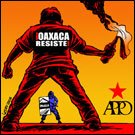CALL FOR INTERNATIONAL SOLIDARITY TO CEASE TO STATE PERSECUTION AGAINST THE PEASANT'S ASSOCIATION OF THE CIMITARRA RIVER VALLEY (ACVC)
Peasant's Association of the Cimitarra River Valley Barrancabermeja, Colombia
Tuesday, October 2nd, 2007
We make a call out for national and international solidarity to cease the state persecution of the Peasant's Association of the Cimitarra River Valley (ACVC), an organization that carries out community, political and social initiatives in the rural municipalities of Yondó, Remedios and Segovia, in the department of Antioquia, and Cantagallo, San Pablo, Simití and Santa Rosa in the southern part of the department of Bolívar. They also have a regional office in the city of Barrancabermeja, all of which are within Colombia´s Middle Magdalena region.
The ACVC implements the goals of the community through 120 Villages Community Councils, cooperatives, fishing and mining committees, women's and youth collectives, along with other peasant worker associations, in the framework of integral defense of human rights and land, as well as the implementation of productive projects for food security, coca crop substitution, and the training and promotion of peasant- farmer organizing processes.
On Saturday, September 29th, 2007 officials of Colombia's Adminstrative Security Department (DAS) detained Andrés Gil, the ACVC's Office Coordinator in Barrancabermeja; Mario Martínez, the treasurer of the ACVC; Óscar Duque, member of the ACVC's Work Team in the Middle section of the Cimitarra River Valley; and Evaristo Mena, member of the ACVC through the Village Community Council of the La Poza, Cantagallo – all of which have been recognized community leaders for over two decades in the region of Middle Magdalena. They are currently imprisoned in Bucaramanga (department of Santander). Today, October 2nd, they will be taken to court to enter pleas.
These detentions are part of the new juducial process against the ACVC, which has also included raids of the apartment and the office of the organization in Barrancabermeja, during which three CPU's with 11 years of documentation of the association's projects, accounting, documents, photographs, and other files were taken. These actions comprise a new state attack to dismantle the peasant organizing process of Middle Magdalena region and disintegrate community development initiatives and the defense of human rights in the Cimitarra River Valley.
This offensive is not new. It is part of a series of interventions that the Colombian State has made against the ACVC over a period of many years and has manifested in acts like the government's incompliance with the agreements signed during the Peasant's Exodus of Middle Magdelana in 1998 and its indolence in applying security measures made to protect members of the ACVC, which were requested by the Inter- American Human Rights Commission.
Likewise, the legal designation of the Peasant Reserve Zone of the Cimitarra River Valley – collectively- owned land established under the Law 160 in 1994 (also known as agrarian reform) which is the equivalent to an Indigenous people's reservation or Afro- Colombian's collectively- owned land – was revoked in 2003. This designation seeks to prevent, if not eliminate, large landholdings, and facilitate processes of redistribution and prevention of division of the plots for mega-development. Additionally, it regulates the settlement on untitled land, giving preference to peasants with scarce resources. That is why the Peasant Reserve Zone is seen as a barrier to the execution of resource exploitation projects like the recently signed agreements with AngloGold Ashanti Mines, a transnational gold company, and investment in the agroindustrial monocrop African palm oil.
On top of all of this, the actions of the Colombian National Army in the region have been directed against the civilian population, by means of: murders of peasant-farmers, arbitrary detentions, use of informants (people often pressured to make up false intelligence for Army), alliances with paramilitaries, robbery, torture and other serious human rights violations.
We reiterate our call out for solidarity and invite our friends, allies, and solidarity organizations – in Colombia as well as in the rest of the world – to promote the following initiatives:
- Solicit a hearing in the Colombian Congress regarding the human rights situation in the Peasant Reserve Zone of the Cimitarra River Valley.
- Denounce, accompany and search for political support for the ACVC in Canada, United States, Europe and Latin America.
- Request a hearing of the Inter- American Human Rights Commission of the Organization of American States to review the case of persecution of the ACVC.
- Convene a meeting of the European Parliament and the European Commission to expose the violations and persecution against the ACVC.
- Expose and disseminate cases of murders, violations and persecution against the ACVC before the World Organisation Against Torture (OMCT), the Human Rights Commission of the United Nations and the International Criminal Court.
Once again we declare that the freedom, physical integrity and life of the members of the ACVC is the sole responsibility of the institutions and government officials who, in the name of the State, should work to guarantee the rights of the peasant population instead of promoting their persecution.
For these reasons, we the undersigned, support the preceding declaration of the ACVC, reaffirming their total legality and legitimacy. We request the immediate release of the imprisoned and suspension of the arrest warrants against the rest of the board of directors.
Signed:









